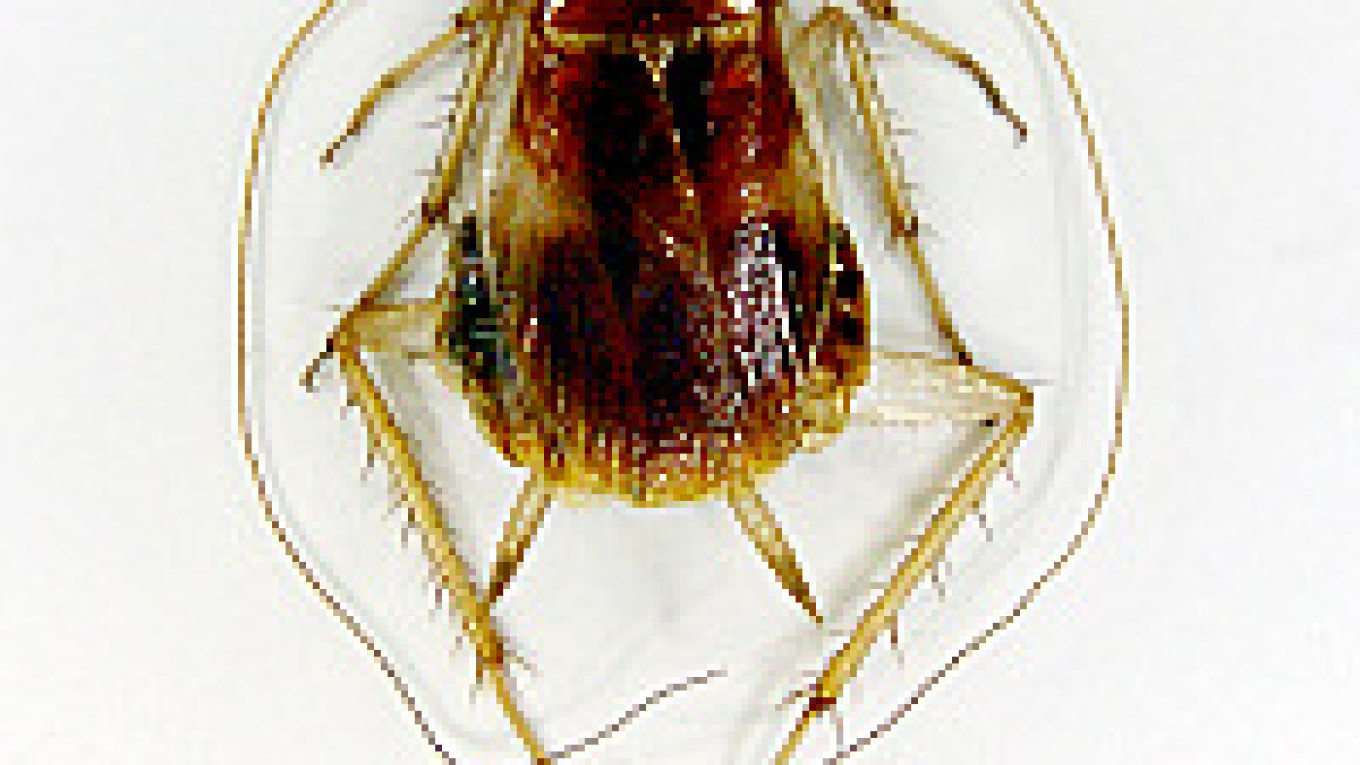But now the once-ubiquitous household pest is leaving apartments and dachas, the victim of efficient pesticides and modern furnishings, and scientists are wondering whether some species should be declared as endangered.
"There are far fewer of them," said Andrei Stukov, a manager at the Moscow-based pest control company Sanita-S. "It has been happening over the last two years, and the result is clear now." He put this partly down to modern wallpaper glue and other do-it-yourself materials that cockroaches can't eat.
Cockroach infestations have fallen by 50 percent in the last year, said Servis-Set, another pest control company.
"The higher the standard of sanitation, the fewer the cockroaches," said Alexander Antropov, a senior researcher at the entomology section of the Zoological Museum in Moscow.
Cockroaches still thrive in old-style housing with dripping plumbing -- providing essential water -- but have died out in new apartments, Antropov said. "The cleaner the apartment is, the fewer chances they have. They just have nothing to eat and drink."
It sounds like good news. But some scientists aren't so sure. Alexander Lagunov, an entomologist who works at the Ilmensky nature reserve in the Chelyabinsk region, wants the black Oriental cockroach -- once the most common type living in Russian homes -- to be officially listed as endangered.
The insect can only survive in warm areas such as apartments. It arrived in Russia sometime during the period of Mongol rule and used to be welcomed by peasants, who believed it brought wealth, Lagunov said.
He told the story of how poet Alexander Pushkin once visited an elderly woman, who, instead of washing up her dishes, simply left them on the table and blew out the candles. The poet was horrified to see thousands of cockroaches appear immediately and polish the plates clean.
In the last half century, though, the black cockroach was almost wiped out by the smaller reddish-brown German cockroach, which is believed to have been brought back from Prussia by soldiers in the 18th century. That species is now becoming rare.
 For MT Lagunov wants the black Oriental cockroach to be listed as endangered. | |
The scientist doesn't advocate reintroducing Oriental cockroaches into people's houses -- he acknowledges that they can carry infectious diseases -- but thinks that a colony of the cockroaches should be established at the Chelyabinsk Zoo. "They preserve American and European bison in parks and zoos," Lagunov said. "Let's preserve Oriental cockroaches in zoos, too."
Lagunov also wants to list two species of cockroach that live in the wild.
Inclusion in the Red Data Book, Russia's official list of rare and endangered species, could lead to the creation of "minireserves" for such cockroaches. But it's unlikely that anyone would be punished for killing one. "Theoretically, it could happen, but practically, of course not," Lagunov said.
Last year, scientists from Voronezh sent the first cockroaches into space, where several bred successfully. But one of the scientists told The Moscow Times that it took three months to find the 54 German cockroaches sent on the flight, and the insects were eventually found in a government building.
It's possible that the cockroach has simply adapted to face its new challenges, however.
One pest control worker said cockroaches are moving out of their traditional haunts in apartments to cellars and attics, where they can now live through the winter. "Because of the warming climate, they find it easier to survive outside heated premises," said Viktor Khudonogov, commercial director at the pest control company Ekoset.
Alexander Benediktov, a researcher at the entomology department of Moscow State University, questioned the need to list the black Oriental cockroach as endangered. "It hasn't died out, and it seems to me that it may rebuild its numbers in the absence of the German cockroach," he said in an e-mail.
Moscow is still home to several other cockroach species, Benediktov said. "Many people have no idea of the other species of cockroaches, which live in cellars, pipelines, warehouses and vegetable stores. But there are at least four such kinds.
"Last August, I caught a live female brown-banded cockroach on a bench near Universitet metro station," he said. "This species lives not only in kitchens, where it can always find food, but also in storage depots and offices and buildings with furniture, which is why it is called a 'furniture cockroach' in Russian."
And as the German cockroach declines, another foreign species may be moving in.
The black American cockroach has been sighted in Moscow, Benediktov said. And the alien species seems to feel at home here.
"Recently, the large American cockroach has been seen often in the cellars of apartment blocks in Moscow. And that's despite the fact that it used to be considered an import. It looks like it has settled in and started to breed."
A Message from The Moscow Times:
Dear readers,
We are facing unprecedented challenges. Russia's Prosecutor General's Office has designated The Moscow Times as an "undesirable" organization, criminalizing our work and putting our staff at risk of prosecution. This follows our earlier unjust labeling as a "foreign agent."
These actions are direct attempts to silence independent journalism in Russia. The authorities claim our work "discredits the decisions of the Russian leadership." We see things differently: we strive to provide accurate, unbiased reporting on Russia.
We, the journalists of The Moscow Times, refuse to be silenced. But to continue our work, we need your help.
Your support, no matter how small, makes a world of difference. If you can, please support us monthly starting from just $2. It's quick to set up, and every contribution makes a significant impact.
By supporting The Moscow Times, you're defending open, independent journalism in the face of repression. Thank you for standing with us.
Remind me later.


